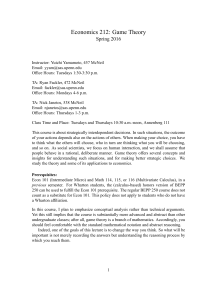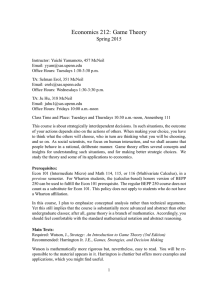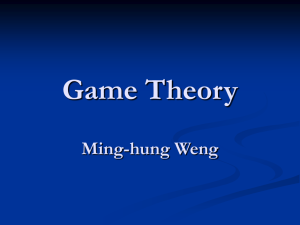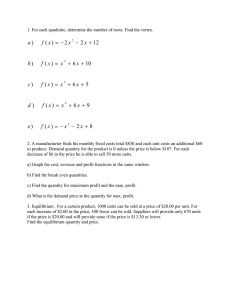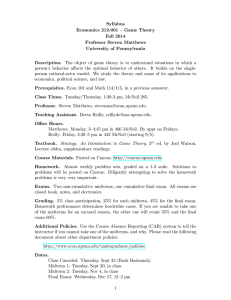Economics 212: Game Theory Spring 2014
advertisement
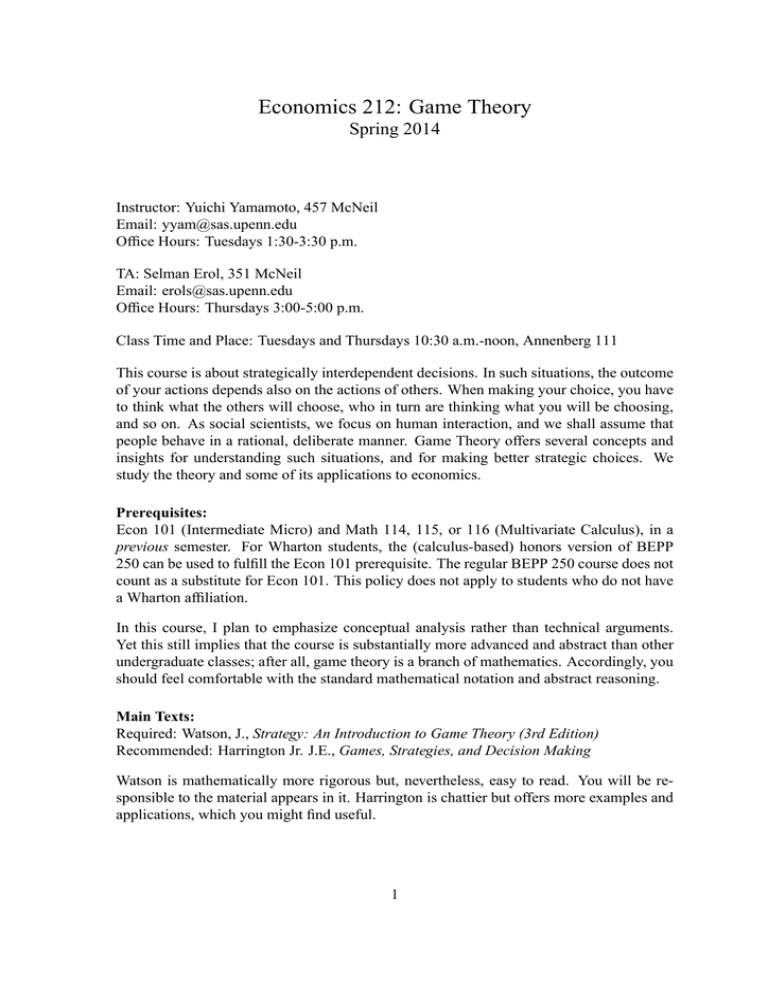
Economics 212: Game Theory Spring 2014 Instructor: Yuichi Yamamoto, 457 McNeil Email: yyam@sas.upenn.edu Office Hours: Tuesdays 1:30-3:30 p.m. TA: Selman Erol, 351 McNeil Email: erols@sas.upenn.edu Office Hours: Thursdays 3:00-5:00 p.m. Class Time and Place: Tuesdays and Thursdays 10:30 a.m.-noon, Annenberg 111 This course is about strategically interdependent decisions. In such situations, the outcome of your actions depends also on the actions of others. When making your choice, you have to think what the others will choose, who in turn are thinking what you will be choosing, and so on. As social scientists, we focus on human interaction, and we shall assume that people behave in a rational, deliberate manner. Game Theory offers several concepts and insights for understanding such situations, and for making better strategic choices. We study the theory and some of its applications to economics. Prerequisites: Econ 101 (Intermediate Micro) and Math 114, 115, or 116 (Multivariate Calculus), in a previous semester. For Wharton students, the (calculus-based) honors version of BEPP 250 can be used to fulfill the Econ 101 prerequisite. The regular BEPP 250 course does not count as a substitute for Econ 101. This policy does not apply to students who do not have a Wharton affiliation. In this course, I plan to emphasize conceptual analysis rather than technical arguments. Yet this still implies that the course is substantially more advanced and abstract than other undergraduate classes; after all, game theory is a branch of mathematics. Accordingly, you should feel comfortable with the standard mathematical notation and abstract reasoning. Main Texts: Required: Watson, J., Strategy: An Introduction to Game Theory (3rd Edition) Recommended: Harrington Jr. J.E., Games, Strategies, and Decision Making Watson is mathematically more rigorous but, nevertheless, easy to read. You will be responsible to the material appears in it. Harrington is chattier but offers more examples and applications, which you might find useful. 1 Grading: Seven problem sets will be assigned. They will be graded on a coarse scale (1-3). No late submission. You are encouraged to work in groups, but write down your solutions individually. When computing your course grade, your two lowest problem set scores will be dropped. (So you can, for any reason, miss up to two problem sets.) Problem set completion counts for 10% of your course grade. There will be two (non-cumulative) in-class midterms and a (comprehensive) final exam. Each exam counts for 30% of the course grade. The midterms will be held on February 20 and on April 8. The final will be held on May 13. If you are unable to take one of the midterms for an excused reason, the other midterm and the final exam each will count for 45% of your course grade. All exams are closed book, notes, calculators, and mobile phones. Fine Print: Students have two weeks from the day in which examinations are returned to report errors in grading and/or to request that problems be re-graded. If a student submits his/her exam for re-grading, then the student’s entire exam will be re-graded (with no guarantee of a higher total score). Please see the department course policies: http://economics.sas.upenn.edu/undergraduate-program/course-information/guidelines/policies Course Outline: (1) Representing Games Lecture 1 (January 16): Strategic Interaction, Utility, Preference. Lecture 2 (January 21): Extensive-Form Games, Normal-Form Games. Lecture 3 (January 23): Experiments. Problem set 1 will be posted. (2) Static Games with Complete Information Lecture 4 (January 28): Dominance, Best Response. Lecture 5 (January 30): Iterated Dominance, Rationalizability. Problem set 1 will be due by the beginning of the class. Problem set 2 will be posted. Lecture 6 (February 4): 2 Economic Applications of ID. Lecture 7 (February 6): Nash Equilibrium in Two-Player Games. Problem set 2 will be due by the beginning of the class. Problem set 3 will be posted. Lecture 8 (February 11): Market Games: Cournot, Bertrand, Minimum-Price Guarantee. Lecture 9 (February 13): Nash Equilibrium in N -Player Games, Competitive Limit. Problem set 3 will be due by the beginning of the class. Lecture 10 (February 18): Review. Lecture 11 (February 20): First Midterm. Lecture 12 (February 25): Mixed-Strategy Equilibrium. Lecture 13 (February 27): Empirical Works, Evolutionary Game Theory. Problem set 4 will be posted. Lecture 14 (March 4): Existence of Nash Equilibrium. (3) Dynamic Games with Complete Information Lecture 15 (March 6): Backward Induction. Problem set 4 will be due by the beginning of the class. Lecture 16 (March 18): Zermelo’s Theorem, Subgame-Perfect Equilibrium. Problem set 5 will be posted. Lecture 17 (March 20): Commitment Effects, War of Attritions. Lecture 18 (March 25): Bargaining. Problem set 5 will be due by the beginning of the class. Problem set 6 will be posted. Lecture 19 (March 27): 3 Repeated Games. Lecture 20 (April 1): More on Repeated Games. Problem set 6 will be due by the beginning of the class. Lecture 21 (April 3): Review. Lecture 22 (April 8): Second Midterm. (4) Games with Incomplete Information Lecture 23 (April 10): Bayesian Nash Equilibrium, Market for Lemons. Lecture 24 (April 15): Auctions. Lecture 25 (April 17): More on Auctions. Problem set 7 will be posted. Lecture 26 (April 22): Signaling. Lecture 27 (April 24): More on Signaling. Problem set 7 will be due by the beginning of the class. Lecture 28 (April 29): Review. 4

